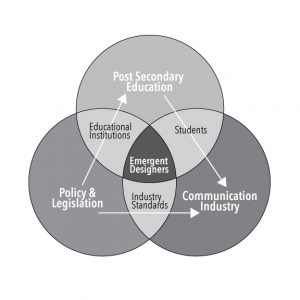Inclusion and Access: Graphic Design Skills for the 21st Century by Jennie Grimard
Graphic Design: A Retrospective
Jennie Grimard
Historical Knowledge
In order to envision the future of graphic design, we need to learn from the past. From the invention of the printing press in the first industrial revolution to the introduction of the personal computer and the availability digital design software in the 80’s; graphic designers have proven to be adaptable and flexible in the face of change.
Today, in the midst of the fourth industrial revolution, graphic designers are being challenged once again to redefine their roles. Rapid advancement in design tools, multi-media communication channels and artificial intelligence are shifting the role of the designer away from simply creators to curators, defining the logic of content in addition to its aesthetic (Designmodo, 2018). The skill set required for a modern graphic designer is broadening beyond ‘making things’ to a more strategic and innovative role rooted in communication. The timeline below explores how technology, cultural shifts affect how information was shared throughout history.
Impact on Education
 Although our education models continue to mirror the scaffolded structure of the Bauhaus curriculum from the 1930’s, design education has evolved to meet the needs of industry, particularly in the digital revolution.
Although our education models continue to mirror the scaffolded structure of the Bauhaus curriculum from the 1930’s, design education has evolved to meet the needs of industry, particularly in the digital revolution.
In Canada, the 21st century will have legislation push designers into an era of inclusion, shifting workflows and deliverables to support increased accessibility and to design multi-sensory modes of communication. Design education plays a vital role in supporting the needs of society, and the industry by developing an emergent workforce equipped with the necessary skills.
Historical Review Key Takeaways
-
- Socio-cultural and technological factors play an important role in how we practice graphic design.
- Design in the 21st century will emphasize accessibility through inclusive processes paired with technical skills.
- Technology and policy will push graphic designers to be strategic and think beyond digital and printed visual communications.


Feedback/Errata